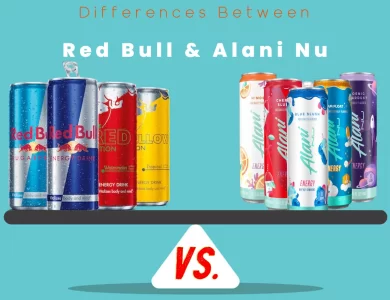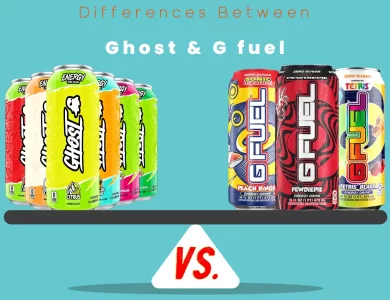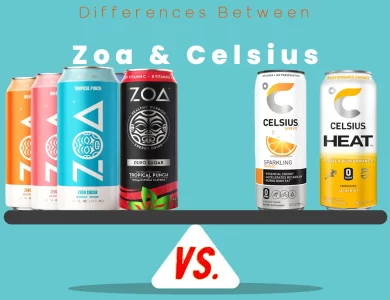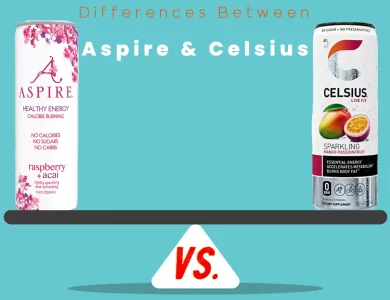
Yerba Mate and Red Bull are two distinct energizing beverages with notable differences. Yerba Mate, a traditional South American drink, is made from the leaves of the Ilex paraguariensis plant and is known for its earthy flavor and cultural significance. It boasts natural antioxidants, vitamins, and minerals, providing a balanced energy lift with the combination of caffeine and theobromine. On the other hand, Red Bull is a modern energy drink that gained global fame, offering an instant jolt of energy with its high caffeine, taurine, and B-vitamin content. Its sweet, fizzy, and tangy flavor caters to those with a preference for sweeter beverages. The choice between Yerba Mate and Red Bull depends on individual taste preferences, health considerations, and the desired type of energy boost.
| Aspect | Yerba Mate | Red Bull |
|---|---|---|
| Origin | Traditional South American drink | Austrian modern energy drink |
| Cultural Significance | Symbol of unity and hospitality | Global energy drink sensation |
| Preparation | Infused from dried leaves and hot water, traditionally sipped from a gourd using a “bombilla” | Ready-to-drink carbonated beverage |
| Nutritional Content | Rich in antioxidants, vitamins, and minerals. Contains theobromine for a balanced energy lift | High in caffeine, taurine, and B-vitamins for an instant energy boost |
| Flavor Profile | Earthy, herbal, and inviting | Sweet, fizzy, and tangy |
| Health Considerations | May increase cancer risk with extremely hot temperatures; moderate caffeine content | Moderation required due to high caffeine and sugar content |
| Caffeine Content | Approximately 30-50 mg per cup | Approximately 80 mg per 8.4 fl. oz can |
| Calories and Sugar Content | Low-calorie without sweeteners | High-calorie with added sugar (sugar-free version available) |
| Environmental Impact | Sustainable harvesting and production | Larger environmental footprint |
| Global Reach | Increasing popularity worldwide | Widely available and dominant in the energy drink market |
Join us on this thirst-quenching adventure as we unveil the enticing contrasts between Yerba Mate and Red Bull. From the earthy aroma of Yerba Mate to the sweet fizz of Red Bull, we’ll explore which energizing beverage aligns best with your taste buds, lifestyle, and health considerations.
Differences Between Yerba Mate and Red Bull
Origins and Cultural Background
Yerba Mate: A Traditional South American Elixir
Our journey begins with Yerba Mate, a drink with deep-rooted cultural significance in South America, particularly in countries like Argentina, Uruguay, and Paraguay. Yerba Mate comes from the leaves of the Ilex paraguariensis plant, which are dried, ground, and steeped in hot water to create the cherished infusion. Traditionally, Yerba Mate is sipped from a gourd using a metal straw called a “bombilla,” fostering a sense of community and friendship as the drink is often shared among friends and family.
Beyond its consumption, Yerba Mate holds a special place in the hearts of South Americans, as it’s a symbol of unity and hospitality. The traditional preparation and sharing ritual, known as “matear,” have been passed down through generations, becoming an integral part of their social fabric.

Red Bull: The Global Energy Drink Sensation
On the other side of the world, we have Red Bull, the famed energy drink that has taken the world by storm. Born in Austria in the 1980s, Red Bull was the brainchild of Dietrich Mateschitz, who sought to create a revitalizing drink inspired by a Thai beverage called “Krating Daeng.” The caffeine-packed concoction was marketed as a “functional drink” and was initially embraced by athletes and busy professionals for its potential to boost energy and performance.
Red Bull’s rise to international fame came through savvy marketing campaigns and strategic partnerships, making it a household name across the globe. Unlike Yerba Mate’s traditional roots, Red Bull boasts a modern and edgy image that resonates with the fast-paced lifestyle of today’s generation.
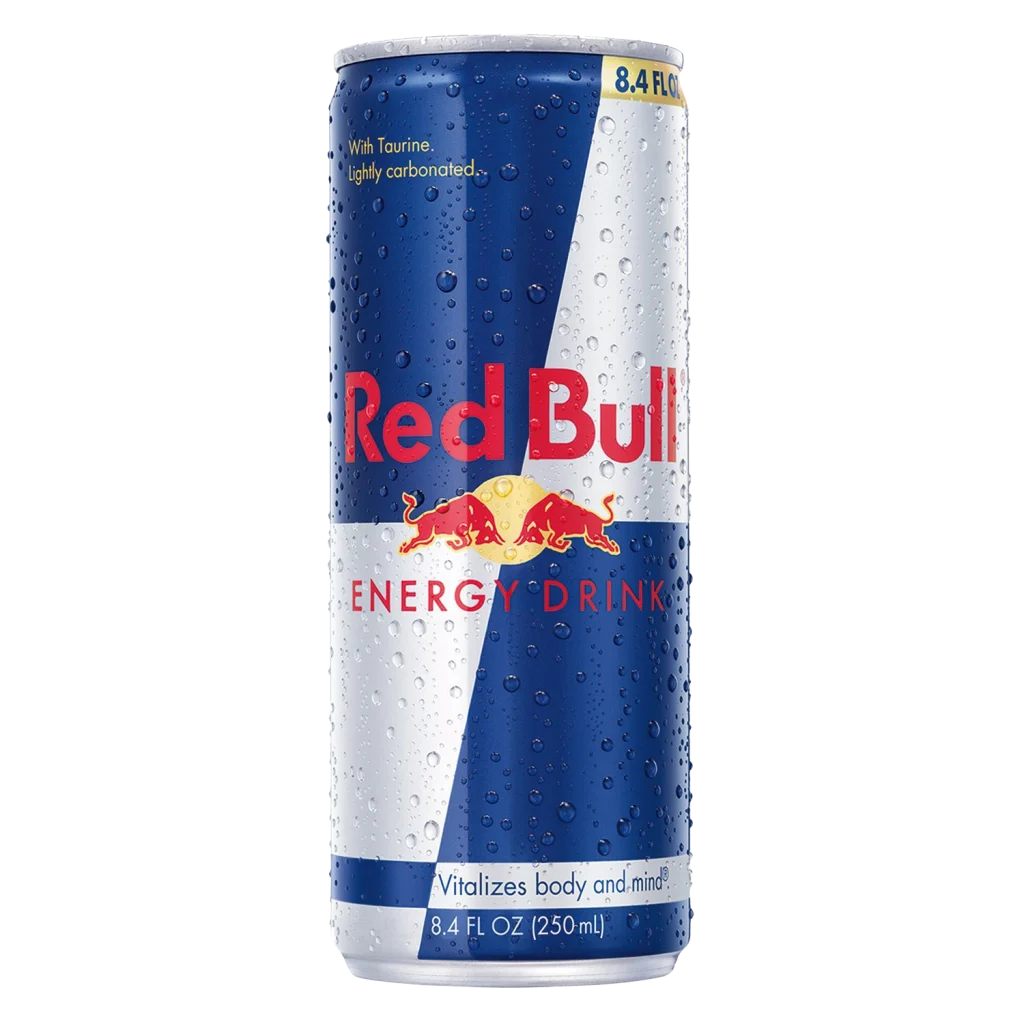
Nutritional Content: A Sip of Energy
Yerba Mate: A Rich Source of Antioxidants
When it comes to nutritional content, Yerba Mate delivers a unique blend of natural goodness. This herbal infusion is packed with essential vitamins and minerals, including vitamin C, vitamin B complex, magnesium, and potassium. But the real star of the show is its abundance of antioxidants, such as chlorogenic acid and quercetin, which help combat harmful free radicals in the body. These antioxidants contribute to Yerba Mate’s reputation as a beverage that supports overall well-being.
Additionally, Yerba Mate contains theobromine, a natural stimulant found in cocoa, which provides a smooth and gentle energy boost without the jitters often associated with caffeine-heavy drinks. The combination of theobromine and caffeine in Yerba Mate results in a balanced and sustained energy lift.
Red Bull: A Burst of Caffeinated Energy
As for Red Bull, its key ingredient and primary source of energy is caffeine. A standard 8.4 fl. oz (250 ml) can of Red Bull contains approximately 80 mg of caffeine, equivalent to a regular cup of coffee. Alongside caffeine, Red Bull includes other ingredients such as taurine, B-vitamins (niacin, vitamin B6, and vitamin B12), and sucrose (sugar) or artificial sweeteners for its sugar-free version.
The combination of caffeine and taurine in Red Bull is believed to enhance cognitive function and improve alertness, making it a popular choice for those needing a quick and powerful boost of energy. However, it’s essential to consume Red Bull in moderation due to its high caffeine content, especially for individuals sensitive to caffeine or those with certain health conditions.
Flavor and Taste Profile
Yerba Mate: Earthy, Herbal, and Inviting
Yerba Mate’s flavor profile is a unique and inviting one. With its earthy and herbal undertones, Yerba Mate has a distinct taste that sets it apart from other beverages. When prepared traditionally, the infusion has a subtle bitterness that’s balanced by a natural sweetness. Many Yerba Mate enthusiasts find its flavor to be refreshing and enjoyable, especially when shared with friends during matear sessions.
The taste of Yerba Mate can vary slightly depending on factors such as the specific brand, the region where the leaves were harvested, and the water temperature used for brewing. Some may prefer to add a touch of sweetness, like honey or sugar, or infuse it with citrus fruits to create their preferred flavor.
Red Bull: Sweet, Fizzy, and Tangy
Red Bull’s flavor profile caters to those with a penchant for sweetness and a hint of tanginess. The drink’s carbonated nature gives it a fizzy and refreshing quality, while the addition of sucrose or artificial sweeteners provides the signature sugary taste that many energy drink enthusiasts crave.
The sweetness of Red Bull is often accompanied by a slightly tangy aftertaste, which can be attributed to the citric acid used to enhance the drink’s flavor. For some, the taste of Red Bull is an acquired one, and it’s frequently consumed chilled to enhance its refreshing appeal.
Health Considerations
Yerba Mate: Embracing Tradition with Caution
While Yerba Mate brings a wealth of health benefits to the table, it’s essential to be mindful of a few potential drawbacks. One of the concerns associated with Yerba Mate consumption is its temperature. Drinking extremely hot Yerba Mate might increase the risk of esophageal cancer, so it’s wise to allow the infusion to cool slightly before sipping.
Additionally, Yerba Mate does contain caffeine, albeit in moderate amounts. Therefore, individuals sensitive to caffeine or those with certain medical conditions, such as heart problems, should exercise caution and limit their intake.
On the whole, enjoying Yerba Mate in traditional moderation, without excessively hot water, can be a delightful and healthful experience. Its natural antioxidants and theobromine make it a worthy contender in the world of energizing beverages.
Red Bull: Moderation is Key
Red Bull’s popularity has led to extensive discussions about its impact on health. While the occasional can of Red Bull is generally considered safe for most individuals, consuming large quantities of the beverage or combining it with other caffeinated drinks can lead to adverse effects such as insomnia, increased heart rate, and jitteriness.
Moreover, the high sugar content in regular Red Bull can contribute to weight gain and tooth decay if consumed in excess. For those watching their sugar intake, opting for the sugar-free version might be a more suitable choice.
As with any caffeinated drink, moderation is key to enjoying Red Bull safely. It’s essential to be aware of individual tolerance levels and consider consulting a healthcare professional, especially if there are underlying health concerns.
Impact on Daily Life and Performance
Yerba Mate: A Social and Invigorating Tradition
Beyond its nutritional content and health considerations, Yerba Mate plays a significant role in the social lives of those who embrace the matear culture. The act of sharing Yerba Mate fosters a sense of togetherness and camaraderie, bringing people closer and providing a space for meaningful conversations.
For many South Americans, Yerba Mate is a constant companion throughout the day, from morning to evening. Its balanced energy boost makes it suitable for various activities, from starting the day with a gentle lift to sustaining focus during work or study sessions. Additionally, theobromine’s calming properties allow for a more relaxed state while remaining alert and engaged.
Red Bull: An Instant Jolt of Energy
Red Bull’s primary selling point is its ability to deliver an instant jolt of energy, making it a go-to choice for those seeking a quick pick-me-up. This characteristic has garnered Red Bull a loyal following among students, athletes, and professionals looking to enhance their performance during demanding tasks or physical activities.
The fast-paced nature of modern life has made energy drinks like Red Bull a popular option for staying alert and energized during busy schedules. However, it’s important to remember that the effects of Red Bull are relatively short-lived compared to the more sustained energy boost provided by Yerba Mate.
Caffeine Content: The Buzz Factor
Caffeine in Yerba Mate
Yerba Mate contains caffeine, but its caffeine content is generally lower than that of Red Bull. A typical cup of Yerba Mate, prepared using 1 tablespoon of dried Yerba Mate leaves, contains approximately 30-50 mg of caffeine. This is about half the amount found in an average cup of coffee. The combination of caffeine and theobromine in Yerba Mate provides a smoother and more sustained energy boost compared to the rapid surge often experienced with highly caffeinated beverages.
Caffeine in Red Bull
Red Bull, on the other hand, is famous for its high caffeine content. As mentioned earlier, an 8.4 fl. oz (250 ml) can of Red Bull contains approximately 80 mg of caffeine, which is roughly equivalent to a standard cup of coffee. This substantial dose of caffeine delivers a rapid and intense burst of energy, which can be beneficial for those needing to stay awake or focused in short bursts.
It’s important to be mindful of the caffeine content in both beverages, especially for individuals sensitive to caffeine or those consuming other sources of caffeine throughout the day. Moderation is the key to enjoying the energizing effects of these beverages without experiencing negative side effects.
Calories and Sugar Content: The Caloric Comparison
Calories in Yerba Mate
Yerba Mate, when prepared traditionally without added sweeteners, is a low-calorie beverage. An 8 oz (240 ml) cup of plain Yerba Mate contains only about 5-10 calories, making it a suitable option for those watching their calorie intake. The caloric value may increase if you choose to add sweeteners like honey or sugar, but it’s still relatively low compared to sugary energy drinks.
Calories and Sugar in Red Bull
In contrast, Red Bull contains a significant amount of calories and sugar, particularly in its regular version. A standard 8.4 fl. oz (250 ml) can of regular Red Bull packs approximately 110 calories and contains around 27 grams of sugar. This high sugar content can contribute to weight gain and other health issues if consumed excessively.
For individuals conscious of their sugar intake or looking to reduce their overall caloric consumption, opting for sugar-free or low-calorie energy drink alternatives may be a more suitable choice.
Environmental Considerations: Sip Responsibly
Yerba Mate and Sustainability
Yerba Mate cultivation and consumption have a long history of sustainability, as the plant is native to South American rainforests and thrives in its natural habitat. The harvesting process is typically done in a way that allows the plant to regenerate and continue growing. Additionally, traditional Yerba Mate production methods often involve minimal use of chemicals and machinery, further reducing its environmental impact.
However, it’s essential to support brands that prioritize fair trade practices and sustainable sourcing to ensure the continuation of these eco-friendly traditions.
Red Bull and Environmental Impact
As a mass-produced beverage, Red Bull’s environmental impact is more significant compared to Yerba Mate, especially considering its global distribution and extensive marketing campaigns. The production of aluminum cans and the transportation of the drink to various regions contribute to its carbon footprint.
While Red Bull has taken steps to reduce its environmental impact, such as using renewable energy sources and eco-friendly packaging, the sheer scale of its production and distribution raises concerns among environmental advocates.
When considering the environmental impact, some individuals may lean towards Yerba Mate as a more sustainable choice, particularly if they prioritize eco-conscious consumption.
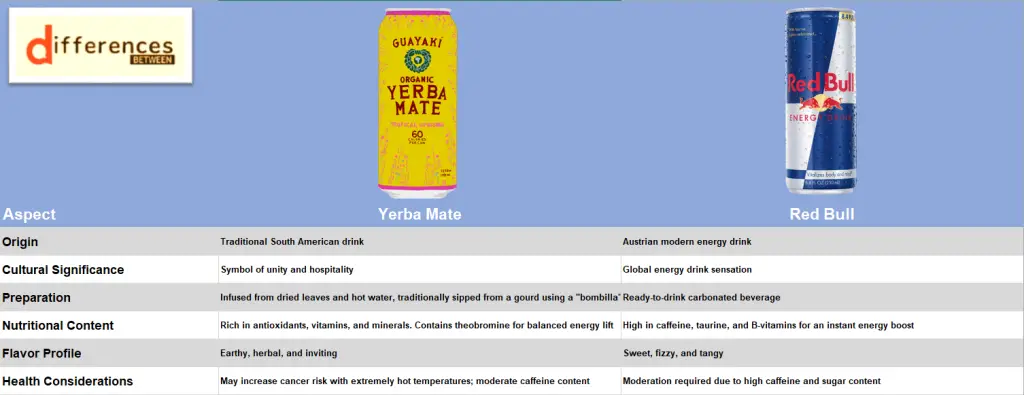
Yerba Mate or Red Bull: Deciding Your Perfect Pick-Me-Up
If you’re wondering which energizing beverage is better suited for you, Yerba Mate or Red Bull, it all comes down to your personal preferences, health goals, and lifestyle. Let’s dive into a quick rundown of their unique qualities to help you make the right choice:
Yerba Mate:
- Ideal for those who appreciate a natural and earthy flavor with a touch of herbal richness.
- A great source of antioxidants, vitamins, and minerals for overall well-being.
- Offers a balanced and sustained energy lift, thanks to the combination of caffeine and theobromine.
- Perfect for social moments and fostering connections through the traditional “matear” ritual.
Red Bull:
- Perfect for those seeking an instant energy boost and a fizzy, tangy taste.
- High in caffeine, providing a rapid jolt of energy for short bursts of activity.
- Convenient and readily available for on-the-go lifestyles.
- Ideal for times when you need a quick pick-me-up during busy schedules.
In the end, the choice between Yerba Mate and Red Bull depends on your flavor preferences, energy needs, and how each beverage aligns with your overall well-being. Remember to sip responsibly and enjoy the invigorating journey that awaits you! Cheers to finding your perfect pick-me-up!
FAQs
Yerba Mate is a traditional South American beverage made from the leaves of the Ilex paraguariensis plant. It is popular in countries like Argentina, Uruguay, and Paraguay, where it holds deep cultural significance. The leaves are dried, ground, and steeped in hot water to create an herbal infusion that boasts a unique and earthy flavor.
Red Bull is a modern energy drink that originated in Austria in the 1980s. It was created by Dietrich Mateschitz, inspired by a Thai beverage called “Krating Daeng.” Red Bull gained international popularity through strategic marketing campaigns and partnerships, becoming a go-to energy booster for athletes, professionals, and individuals with demanding schedules.
Yerba Mate contains essential vitamins, minerals, and antioxidants, making it a health-conscious choice. Its caffeine content, combined with theobromine, provides a balanced and sustained energy lift. On the other hand, Red Bull is high in caffeine, taurine, and B-vitamins, delivering a quick and intense energy boost. However, it’s essential to be mindful of its sugar content in the regular version.
Yerba Mate is known for its herbal and inviting taste, with subtle bitterness balanced by natural sweetness. Red Bull, on the other hand, boasts a sweet, fizzy, and slightly tangy flavor, appealing to those with a preference for sweeter beverages.
Yerba Mate’s traditional cultivation and production methods are generally more sustainable and eco-friendly. Red Bull, being a mass-produced beverage with global distribution, has a larger environmental footprint, despite efforts to implement eco-friendly practices.
Yerba Mate shines as a social beverage, often shared among friends and family during the traditional “matear” ritual. Its communal aspect fosters connections and meaningful conversations. While Red Bull is convenient for on-the-go consumption, it may not have the same social appeal as Yerba Mate.
Read More:
Contents

